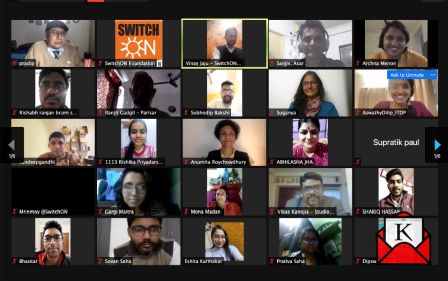Workshop On A Road Towards Clean Air And Sustainable Mobility Organized


SwitchON Foundation organized a virtual multi-stakeholder workshop on the topic ‘A Road Towards Clean Air and Sustainable Mobility’. A high-level panel discussion was also organized as a part of the virtual event.
Ms. Aswathy Dilip – South Asia Director, ITDP, Mr. Ranjit Gadgil, Programme Director Parisar, Mr. Sandeep Gandhi (Principal)-Researcher and Sustainable Mobility Professional) SG Architect were some of the participants of the webinar.
The objective of the webinar was to raise awareness on the role of sustainable mobility and clean transportation as an apparatus for cleaner air, reducing congestion, and improving safety and a more inclusive model of transport in Kolkata. There is an urgent need to realign planning priorities and pay special attention to Non-Motorised Transport (NMT) as an integral part of the overall mobility and transport for Kolkata.
Vehicular pollution along with challenging road conditions faced by pedestrians and cyclists call for a shift in the current transportation system in Indian cities. As embraced by various global cities, cities in east India need Non-Motorised Transport (NMT) supporting infrastructure to mitigate the challenges faced by pedestrians and cyclists and to make their transportation system sustainable.
The virtual event was attended by distinguished urban planners, urban designers, sustainable mobility experts, environmentalists, campaigners, researchers, and members of the civil society organization from across the country.
There is a growing belief that people ideally should have the right to choose their transport and the right to move freely. Therefore, planning for NMT not only makes economic sense because of the high prevalent mode shares but also contributes to social equity by improving accessibility to jobs and houses. In addition, NMT modes are completely non-polluting and help to reduce the environmental burden of the city.
The keynote address of the webinar during the opening session was delivered by Shri Rajanvir Singh Kapur, IAS, Managing Director of WBTC. He said that a social change needs to come where people pick up these activities out of concern for the environment and pleasure instead of only compulsion. In Europe, some streets are exclusively reserved for NMT, and cars are banned there, and such initiatives should be taken up in Kolkata as well.
During the event, the task of creating a framework of the Youth Charter was also announced. The charter would be built on a vision to make Kolkata one of the most liveable cities for its citizens by 2030.
Priyanka Dutta
